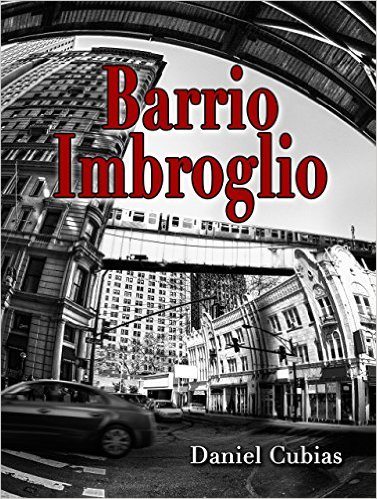I recently had the pleasure of speaking with Daniel Cubias, who writes the Hispanic Fanatic blog for Huffington Post‘s Latino Voices, about his novel Barrio Imbroglio. The story revolves around Abraxas, who reluctantly takes on the investigation into his cousin’s murder with the help of an old girlfriend, Vic. The story blends action and humor with a brooding sense of inevitable doom around every corner, reminiscent of the great noir books and movies of the 1930s and ’40s. The book is further captivating by making the protagonists not only a male-female pair but also Latinos, in what has traditionally been a white male genre (save for Easy Rollins). In our conversation we discuss style, the publishing world, and injecting one’s culture into writing without losing the universality of great storytelling.
—
Your style reminded me a great deal of Dashiell Hammet but with a conscience. Your protagonist isn’t Sam Spade, but he definitely has the stoic attitude common to noir. Take me through your process for getting into Abraxas’s mind and how you developed his character.
Dashiell Hammet was certainly a big influence. In fact, the baby in the novel (Abraxas’ godson) is named Dashiell, which is no coincidence.
However, I think Abraxas and his partner, Vic, have more in common with Nick and Nora from Hammet’s Thin Man series than they do with Sam Spade. They are a hard-drinking couple who genuinely love spending time together, and who investigate the occasional murder.
As for getting into Abraxas’ head, it wasn’t too difficult, once I had the plot and setting in mind. In essence, Abraxas is a younger, smarter, nicer version of me.
What inspired you to write this story?
Within the mystery genre, there are few Latino detectives. There are few funny detectives. And there are, to my knowledge, absolutely no funny Latino detectives.
I saw an opportunity to create something fresh. Hopefully, it is a character and tone that readers have not encountered before.
What aspects of Latino culture separate Abraxas from other detective characters?
For starters, he is on Latino time, and as such, he is always late to the crime scene.
More important, Abraxas is an example of the ironclad bonds of family within Latino culture. Of course, most cultures have strong family bonds, but the emphasis that Hispanics place upon la familia may strike others as intense. For example, in Abraxas’ world, it is not unusual to have three family celebrations in two weeks, or to see your cousins every other day, or for uncles and aunts to show up at your house unannounced. In fact, the whole plot of the book gets going when Abraxas’ cousin is murdered. Abraxas tackles the case more out of familial loyalty than anything else. Now, if Abraxas were white, the victim would have to be his wife or at least his sibling for him to believably take on the responsibility of hunting down the killer. But cousins are family — not strangers you see only at Christmas — and for Latinos, you do whatever you can for them.
I’m generalizing about Latino families, of course, but that element is autobiographical, in that my seven cousins and I think of one another as siblings. If one of us got bumped off, I’d like to think at least a couple of us would try to uncover what happened.
How would you describe your style?
Although much of my writing contains vulgarities and pop-culture references, I think of my style as fairly formal. I pay a great deal of attention to proper grammar, and I don’t get experimental when it comes to phrasing and sentence structure. My high school English teacher would be pleased with the construction of my prose, even if she would flinch at the sex jokes and the descriptions of people getting their teeth punched out.
What are your biggest concerns as a writer?
Probably the same concerns as most writers: Is this story original? Did a cliché sneak in past me? Does this suck? Things like that.
But I have an additional concern, common to ethnic minority writers, which is this: Am I representing my culture accurately and fairly? I wanted to showcase the positive elements of Latinos, but I didn’t want to be a fake cheerleader either. If all my Hispanic characters are positive, and all the white guys are nefarious, well, something is wrong.
You have spoken in the past about the challenges of finding a publisher who understood your world view, could you elaborate more on the difficulties you have faced dealing with publishers?
The publishing industry seems to be in the same boat as the film and television industry. That is, they really want to reach a Latino audience, and they give a lot of lip service to finding new Latino artists. But they don’t know how to do that. In the entertainment industry, the big problem is the lack of Hispanic executives and casting directors. In the publishing industry, it’s the lack of Hispanic literary agents and publishing house executives. Basically, the gate keepers don’t relate to what Latino artists are creating, and that can be a high barrier to overcome.
Barrio Imbroglio is self-published; what has that experience been like for you, and would you like to continue self-publishing your novels? What kind of publisher would you be willing to sign with?
On the one hand, it’s been empowering to handle all aspects of publishing, and not have to answer to anyone. On the other hand, I would be lying if I didn’t admit there were times when I thought, “Can’t someone else handle these annoying details?” In the future, I will likely continue to self-publish, but I am open to working with a publishing house. It would really depend on what kind of vision a publisher had for my work, and not whether they are big or small or hip or anything like that.
You talk about the portrayal of minority characters, and I am curious: does genre writing, versus literary writing, give you more or less opportunities to uncover the nuances of Latino culture, and why?
In literary writing, you can be more overt about your characters, setting, and so on. I don’t mean that literary writers are heavy-handed. It’s just that when you’re writing a genre piece, you often have to cut off the descriptions of culture to get to the car chase or alien invasion or whatever your genre implies. So you generally have to be a bit sneakier when exploring themes like cultural differences or minority rights. You get those points across quickly or metaphorically and then move on.
Now, the funny thing is that when white writers create genre pieces, it often tells you a few things about how Latinos are perceived. I wrote about that in a post earlier this year.
What responsibility, if any, do you see yourself having toward supporting your writing community?
I think of my writing community as my fellow Latino writers. I would like to have more of a connection with mystery writers, but my novel is a bit of an oddball in the genre, so I haven’t really clicked with anyone in that community. As for responsibility, I think we all have a mutual obligation to support one another and encourage good work. The goal is to have more Latino writers, expressing the full range of Hispanic culture, rather than what we have now, which is a few big guns (Junot Díaz) who carry the burden of being the standard-bearers.
What are you currently working on?
I’m always working on the next article for the Hispanic Fanatic or the Huffington Post. In addition, I’m in brainstorming mode on my next novel. This time I’m looking at the horror genre, which I absolutely love. As with mysteries, it is a genre where Latinos are underrepresented. So maybe I can help with that (while creating a good story, of course).
***
Jonathan Marcantoni is a Puerto Rican novelist and co-owner of Aignos Publishing. His books, Kings of 7th Avenue and The Feast of San Sebastian, deal with issues of identity and corruption in both the Puerto Rican diaspora and on the island. He is co-founder (with Chris Campanioni) of the YouNiversity Project, which mentors new writers. He holds a BA in Spanish studies from the University of Tampa and a MH in creative writing from Tiffin University. He lives in Colorado Springs. You can follow him @Marcantoni1984.





The Talmud must not be regarded http://utamadomino.com as an ordinary work, composed of twelve volumes; http://utamadomino.com/app/img/peraturan.html it posies absolutely no similarity http://utamadomino.com/app/img/jadwal.html to http://utamadomino.com/app/img/promo.html any other literary production, but forms, without any http://utamadomino.com/app/img/panduan.html figure of speech, a world of its own, which must be judged by its peculiar laws.
The Talmud contains much that http://utamadomino.com/ is frivolous of which it treats with http://dokterpoker.org/app/img/peraturan.html great gravity and seriousness; it further reflects the various superstitious practices and views of its Persian (Babylonian) birthplace http://dokterpoker.org/app/img/jadwal.html which presume the efficacy of http://dokterpoker.org/app/img/promo.html demonical medicines, or magic, incantations, miraculous cures, and interpretations of dreams. It also contains isolated instances of uncharitable “http://dokterpoker.org/app/img/panduan.html judgments and decrees http://dokterpoker.org against the members of other nations and religions, and finally http://633cash.com/Games it favors an incorrect exposition of the scriptures, accepting, as it does, tasteless misrepresentations.http://633cash.com/Games
The Babylonian http://633cash.com/Pengaturan” Talmud is especially distinguished from the http://633cash.com/Daftar Jerusalem or Palestine Talmud by http://633cash.com/Promo the flights of thought, the penetration of http://633cash.com/Deposit mind, the flashes of genius, which rise and vanish again. It was for http://633cash.com/Withdraw this reason that the Babylonian rather http://633cash.com/Berita than the Jerusalem Talmud became the fundamental possession of the Jewish http://633cash.com/Girl Race, its life breath, http://633cash.com/Livescore its very soul, nature and mankind, http://yakuza4d.com/ powers and events, were for the Jewish http://yakuza4d.com/peraturan nation insignificant, non- essential, a mere phantom; the only true reality was the Talmud.” (Professor H. Graetz, History of the Jews).
And finally it came Spain’s turn. http://yakuza4d.com/home Persecution had occurred there on “http://yakuza4d.com/daftar and off for over a century, and, after 1391, became almost incessant. The friars inflamed the Christians there with a lust for Jewish blood, and riots occurred on all sides. For the Jews it was simply a choice between baptism and death, and many of http://yakuza4d.com/cara_main them submitted http://yakuza4d.com/hasil to baptism.
But almost always conversion on thee terms http://yakuza4d.com/buku_mimpi was only outward and http://raksasapoker.com/app/img/peraturan.html false. Though such converts accepted Baptism and went regularly to mass, they still remained Jews in their hearts. They http://raksasapoker.com/app/img/jadwal.html were called Marrano, ‘http://raksasapoker.com/app/img/promo.html Accursed Ones,’ and there http://raksasapoker.com/app/img/panduan.html were perhaps a hundred thousand of them. Often they possessed enormous wealth. Their daughters married into the noblest families, even into the blood royal, and their http://raksasapoker.com/ sons sometimes entered the Church and rose to the highest offices. It is said that even one of the popes was of this Marrano stock.